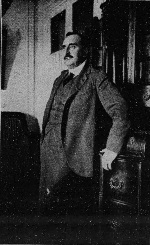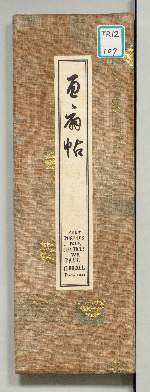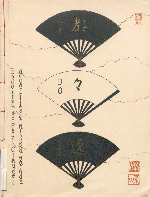![]()
Section 2: Paul Claudel - Poet and ambassador
French playwright and poet Paul Claudel (1868-1955) was appointed as the French ambassador to Japan in November of 1921. Claudel sat for the foreign service exam and passed first on the list, and was a talented diplomat who worked as the ambassador to the United States and was fascinated with Japan from a young age as a result of the influence of his older sister Camille (1864-1943) who was famous as a disciple of François Auguste René Rodin (1840-1917). It is said he thought of becoming a diplomat as a shortcut to travelling to Japan. In April 1927, up until he was reassigned as the ambassador to the United States, he spent approximately 4 and a half years in Japan, with approximately a 1 and a half year vacation and return home during the period, interacting with influential members of the political world and culturati. During this time, he experienced the Tokyo Earthquake of 1923, worked to establish the Franco-Japanese House, and wrote his most important work The Satin Slipper. Claudel was known as a Catholic poet, however he possessed a deep understanding of the sensitivities of the Japanese, and he left behind a haiku and dodoitsu style short poems and a collection of essays (The black bird in the rising sun, with the black bird in title referring to the Japanese name adopted by Claudel) on themes of Japanese culture.

Paul Claudel, TAKAHASHI Kunitarō (Tr.), 1914nen kōtansai no yoru, Bunsensha[et al], 1921 [501-183] 
This is the first of Claudel's plays to be translated into Japanese. The translator's foreword states, "Soon, he will travel to Japan as the ambassador", and this work was translated and published at the request of the publisher to coincide with Claudel's trip to Japan. The work was written in 1915 during World War I, and it is a work which is strongly colored by Catholicism and patriotism. The translator TAKAHASHI Kunitaro (1898-1984) later became a reporter and announcer for NHK while continuing his French literature studies. TAKAHASHI was the first to introduce Seireishū, the abridged translation of the Kokin Wakashū done by SAIONJI Kimmochi while staying in France, and was known as a pioneer in the study of French-Japanese relations.

Paul Claudel, Hyakusenchō, [Koshibasha], 1927 [YR12-107] 
This is a collection of short poems of which 200 copies were published on the occasion of Claudel leaving Japan as if as a parting souvenir. The work is 3 volumes in an accordion book style containing 172 poems in renku (lit. linked verses) style. The French portions are by Claudel himself, with the titles and Kanji (Chinese characters) added to each section by ARISHIMA Ikuma (1882-1974). The works include simple poems about nature which could be said to be haiku, such as "Bruit de l’eau sur de l’eau/ ombre d’une feuille/ sur une autre feuille (shadows of leaves reflected in the sound of water on water)". In a lecture, Claudel states that the key to understanding Japanese culture is in the expression "mono no aware (lit. pathos of life)", which is an expression of the admiration and emotion of the moment when nature's mysteries are revealed, and then the nature of Japan which he saw was not something that was confronted at a distance, but a familiar thing filled with grace. Transitory nature of winged insects, intimately sympathetic small plants and animals, arts which dynamically captured these lives, etc. For Claudel, Japan was a place of constant curiosity and discovery.
Paul Claudel (peintures de Rihakou HARADA), Dodoitzu. nrf, c1945 [KR153-A54] 
A collection of adaptations of Japanese folk songs by Claudel. Published in Paris in the year Japan lost the war. This does not collect only popular ballads from the Edo to Meiji Eras (the so-called "dodoitsu"), but contains French translations of 26 works from a wide range of periods which are presented together with illustrations by painter Rihakou Harada (1890-1954) who lived in France. The content mostly consists of relaxed love songs. The Anthologie de la poésie japonaise [KH8-8] by Japanologist Georges Bonneau (1897-1972) was used as reference during the translation.
During his time in Japan, Claudel travelled to various regions on both personal and official business, and formed relationships with a large number of important people and culturati. Based on the international cooperation policy promoted by Aristide Briand (1862-1932), Claudel actively worked to tighten relations with Japan, with results embodied in the establishment of the Franco-Japanese House and other achievements. However, as Claudel predicted in his diplomatic letter, Japan's isolation from the rest of the world intensified, and the military increased in power and the country walked the path to destruction. When he received news of Japan's defeat, he wrote a reluctant parting to the old Japan in the essay, "Adieu, Japon! (Goodbye, Japan!)".









